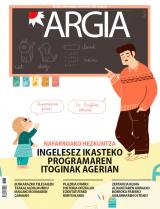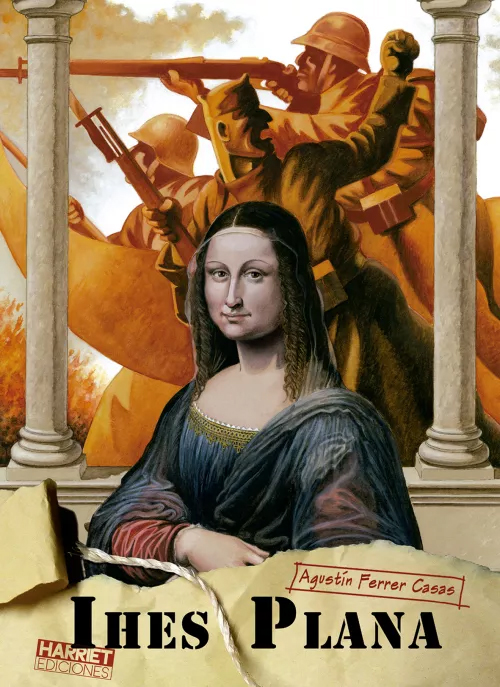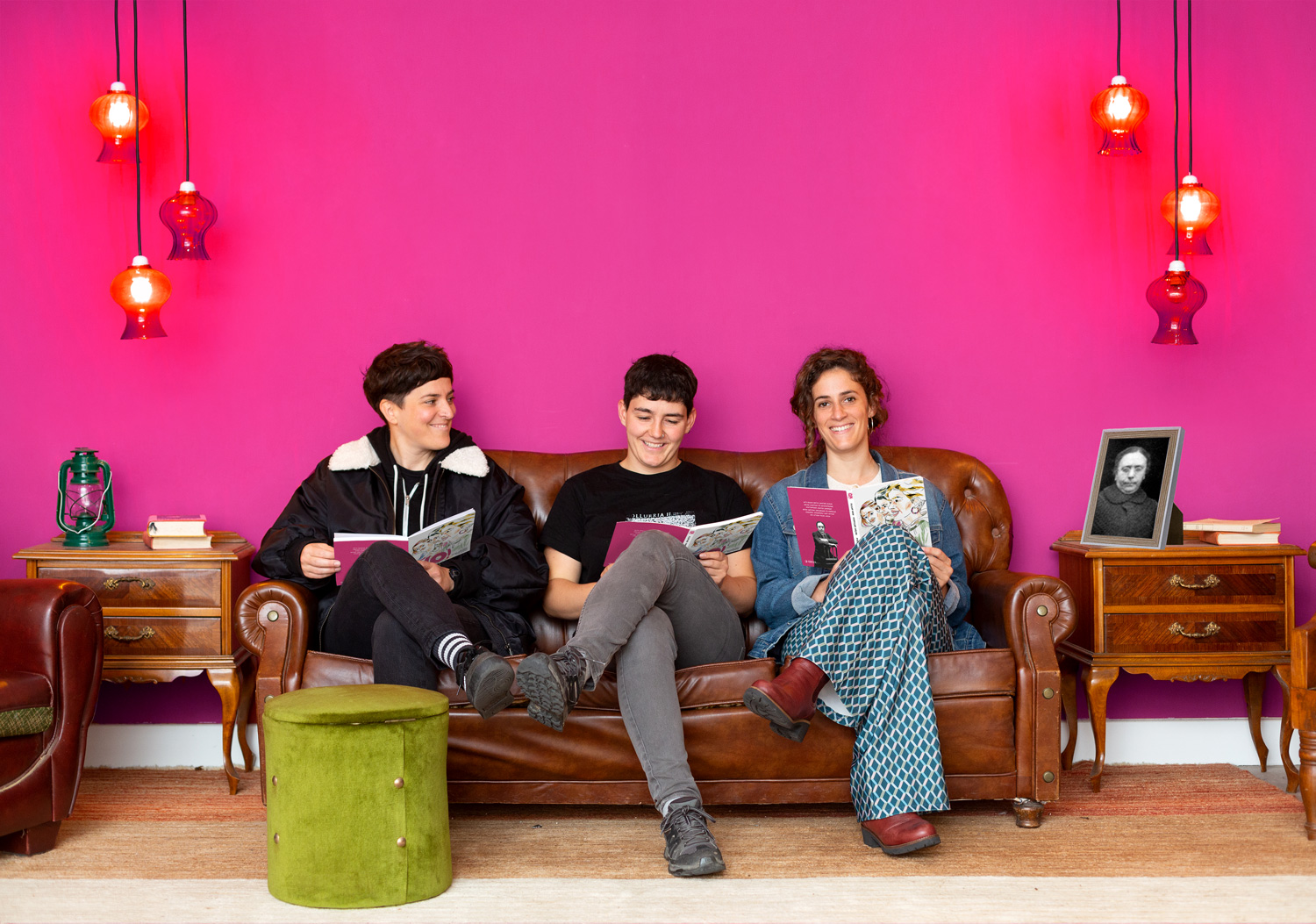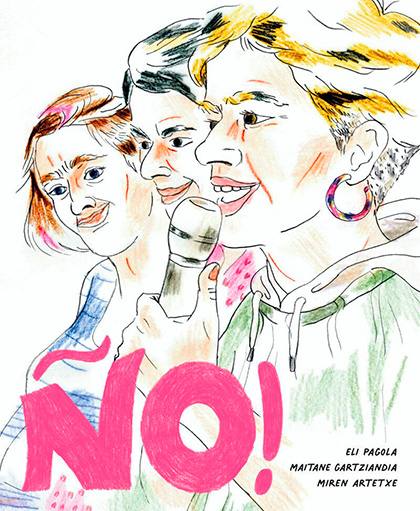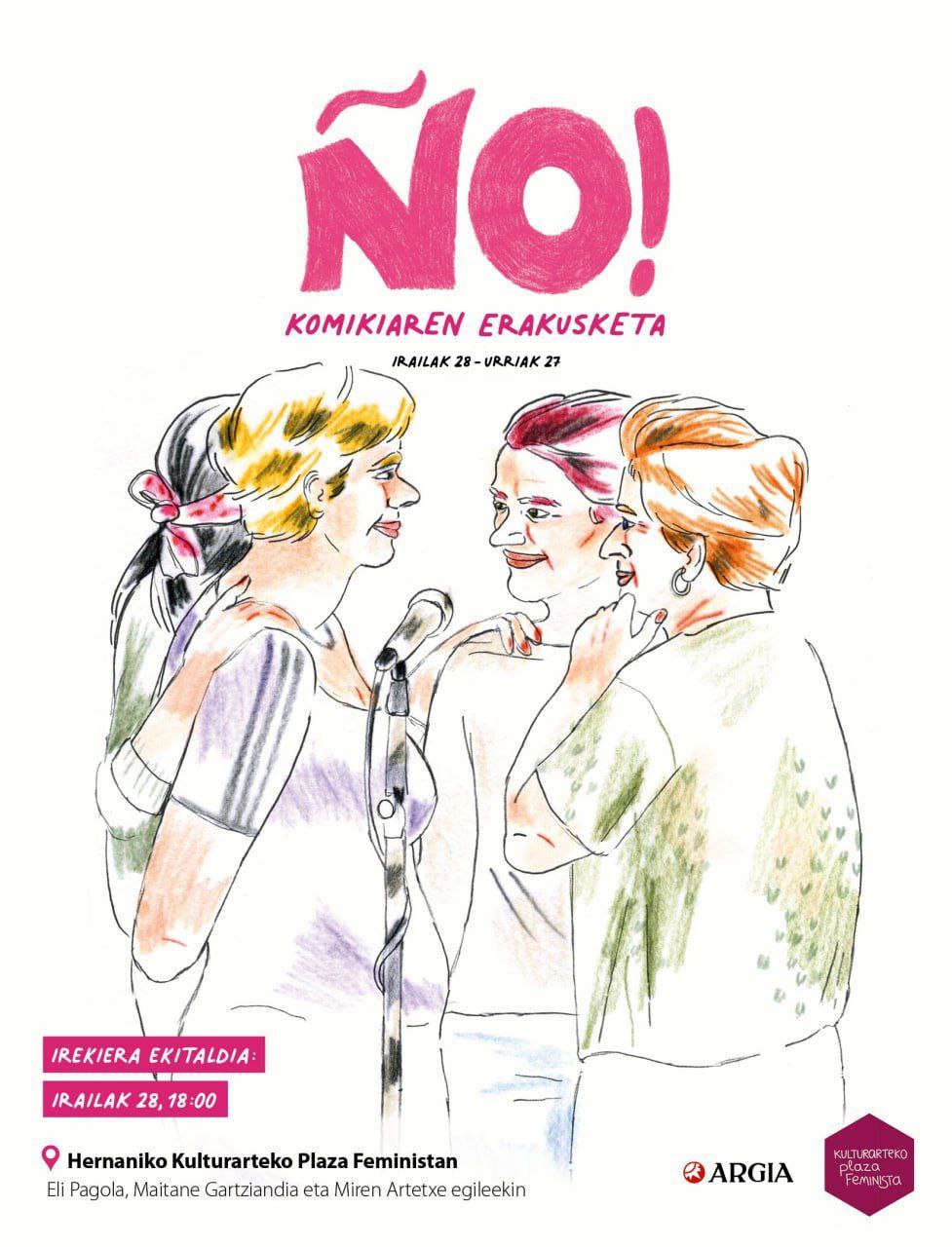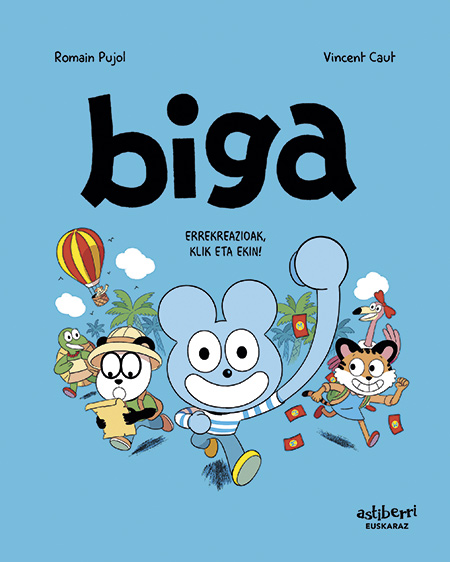"I'm like secondhand clothing."
- Word and drawing. Drawing and word. Draw the words and say the drawings. Take a pencil out of your mouth and hold your tongue in your hand. “Vendita Santa Barbara, tralaralai...”.
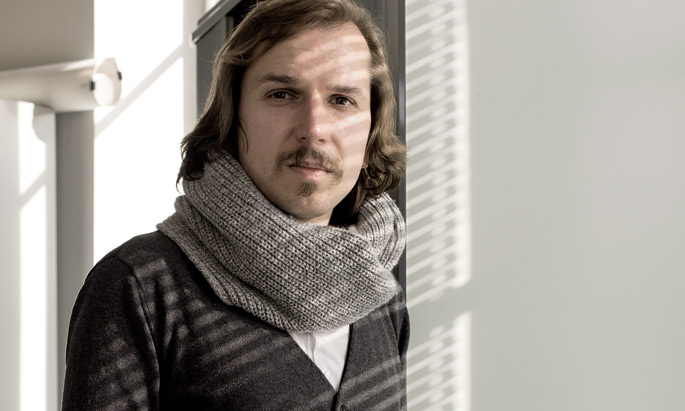
If you had to draw your childhood...
It would be gray. Industrial childhood in a small town in the mining area of Asturias. Mine is the childhood of a missing world. Coal mines, trade unions, housing environment between workers' coughs... I come from a way of life between the industrial world and the rural environment, a geographically and socially isolated environment. In the early 1990s, because of our serious economic situation, parents were forced to remove television from their homes. I found salvation in books. They helped me escape from a world that I didn't like, discover other worlds and develop curiosity.
Do you draw those worlds of curiosity?
I was copying comics from Asterix, illustrating magazines from school, making cartoons of friends and teachers ... So I didn't have the ability to relate to people. My word was as brief as obtuse. I was communicating drawing. That's why I've kept drawing. As the gift of the word unfolds, drawing becomes useless to people. Before I learned to defend with words, it was too late to reject the drawing, I already had my sixth finger on the pencil. It is paradoxical to put aside the ability to draw in the education that prepares us for the image society.
They say you are “lean, shy, provincial and social democrat.”
What do our resumes say about us? Few things. They don't explain where we came from, why we are how we are, why one expression tempts us more than another, why we do what we do ... So I'm interested in defining myself. These four titles present me much better than my college degrees. If I had been raised and raised in Madrid or Barcelona, I would have been another draftsman. In Asturias I didn't have feedbacks, I couldn't connect with anyone. My influences have nothing to do with the comic. I've been away from the passionate world of cartoonists and illustrators until I landed in Angulema. That's how I wrote my books. It is no coincidence that my first works are located in Crimea or Palestine, in areas that I did not know well. Living in a drowned town of 2,000 people, the body asked me for the world. Instead, by putting the bags in Angulema, I started drawing the accounts of Asturias. Everything makes sense in an author's trajectory. It is essential to know the lifestyle of the author to understand his work. That is why I am often interested in the life of the author rather than the work of the author.
How would you define your drawing?
It's pretty free. A little dirty. As for forms, perspectives and characters, it seems little worked, but with a lot of detail. I really try to make the environment, the stage, real. I strive to give a real picture to the characters. The truth of the details is essential to me. Drawing frees me and binds me to documentation. In this struggle it is not easy to find the balance between words and image. The Dublins, for example, were unbalanced in favour of the word. With La Balada del Norte I decided to remove the text, to filter out my intentions and to guide it as accurately as possible. There's no manual. It's a golden rule for many not to repeat what appears in the drawing, but sometimes that's what I'm interested in. Everyone has to find their style, their voice, their tone. The book works if it catches the reader. There is no more.
“Despite cracking, France has culture as an added value. The facilities in France are not the same in Spain”
You, so far, have found your voice in historical contexts.
History saw the present with realismo.Me I refer to the war of La guerre du Professeur Bertenev, nationality, friendship of times... At Café Budapest, on identity, on religion, on the sides of conflicts... They're very universal themes that don't go out of fashion. My work is full of reflections from history and literature. I am in a particular place in history and I try to reflect on current issues. I create fictional characters on a real stage. I couldn't chain any reader with a book that recounts the Crimean war as such. I would not say anything interesting that no one has said before. Memory is not only telling the past, but also understanding the present.
The poet would write that memory looks like mines.
From the mine memory and the memory mine, La Balada del Norte counts. In Asturias, the year 1934 was suggested and everything is very mythical, romantic, but nobody knows exactly what happened. Some invent what did not happen, others remember what suits them, and without realizing it, we are talking about a life that is going to disappear completely unworthy. Oblivion is unfair. The grey mining area of Asturias does not correspond to the touristic, bucolic and gastronomic Asturias to be sold. All the evils of the world are attributed to the trade union struggles of the time, to the roadblocks of the days of strike and to the jets of the miners. There is no awareness of that world. We are the dust hidden under the Lanpas, a territory sacrificed by industry and coal, very socially, ecologically and intimately degraded. Life doesn't end when they're blown off the newsstands. There are people who are still there, others have to leave, but they are all wrong. Asturias has been very unfair with its history.
The authorities insist on not confusing memory with politics.
For me, everything is political. My books don't look like it, but they all have some politics. My works are works that arise from questions, and behind any question is politics. Although political coherence is not fashionable, I try to maintain it. Politics is not the dance of parties' chairs, but everything that starts with honesty. Being honest with myself is the only way to be honest with readers. If an author misses himself, he misses his readers. In the absence of honesty, the most beautiful drawings in the world are useless, and my eyes will not consider them beautiful. Honesty, honesty and honesty. There is nothing more political than that.
“Je suis Charlie” screamed around the world.
At first, Charlie was the whole world, an automatic solidarity reaction was launched, a concentration was conducted led by leaders from all over the world in Paris, Charlie Hebdo was declared a national patrimony of the state... but over the months, the cartoonists of the magazine have been lost in an oasis desert and have felt lonely. They have been very consistent with their nature. They continue to make a raw and provocative humor that can never be of bad taste. Those who could not withstand the pressure have stayed on the road. But in the end, nobody remembers Charlie Hebdo. I hear more and more people who are just closing down. If I worked at Charlie Hebdon, I would have every day the breath of self-censorship on the chin. How far to go, when to cut... I can't laugh at anything. I set limits. In my books, on the contrary, I feel free.
What do you say when you see the list of nominees for the Grand Prix of the Angulema Comic Festival composed exclusively of men?
The world is changing, society is changing, but the festival remains the same. The organization has gotten comfortable. They did not want to make an effort to see the obvious. They've been hidden in the liver of the masculinity of comic book history. Despite the outbreak this year, the case is long-standing. So far men have played a very comfortable role. We have made ourselves believe that it was not our struggle not to give up our privileges. How is our struggle not going to be? During the party, the female comics who led the protest displayed twenty cartoons of all kinds, asking the public if each of them had been drawn by a woman or a man. The public judged that there were three of them made by their wives. In practice, they all belonged to women. It's very significant. Our prejudices leave us open. It's up to all of us to change, also to the Angulema festival.
Can the market change its author?
The Spanish comic market has travelled, won readers, got its place in the department stores, has a national prize that gives it prestige, we are called literary festivals... but the market is not enough to captivate anyone. In France, on the other hand, there is the comic book industry, the competition to swallow most of the cake. So, those who work with big publishers have to publish it every six months, they are asked to draw what is sold, they have very strict delivery dates... They have nothing to do with those who spend two or three years making a book. They know they won't be able to live from it. Snipers, independent. For me, it's not just to create dramatic comics, but also to create illustrations or give workshops. I'm not obsessed with taking life out of comics. Not in vain, Eddie Campbell, creator of comics, states that the comic book has reached the level of intellectual estimation that poetry reached in the 19th century and that, as poetry, we have to sink into oblivion. It's a good guideline for putting your feet on the ground and letting your mind fly.
Let your mind fly -- until you find the fog itself?
I live in the confusion of what I want to do, what I can do, what is only mine and what I do for others. I'm not a very safe person. I don't have principles, absolute truths, extreme words. I live on the path of curiosity, of constant search. In these times when everything is changing, diffuse and liquid, this is a very sliding and fragile field. The world goes too fast to have a monolithic view of everything. I'm like a second-hand suit, never fashionable, never completely out of place, and in the end it finds its place.
For the authorities, culture is always last-ditch.
In France, the real Ministry of Culture has been since the 1980s. It moves money and has a strategy for cultural exception. It gives money to French cinema because it is French, it sets fees in cinemas, it has a wide network of libraries and libraries, it drives festivals ... Despite cracking, culture is an added value for France. The facilities in France do not exist in Spain. Because in Spain, culture is not given importance. Spanish writers are no worse than the French, French musicians are no better than the Spanish -- the network of work and people's perception make a difference. For example, comics is a passion that works from children in France. The market invests money, school libraries are full of comics, festivals are made for children... In Spain, no future reader is cared for. So where is it going to attract the amateurs? Wanting to harvest without sowing has nothing to do with culture.
Sowing or harvesting the crops, how would you draw your grandfather Alfonso Zapico?
I appear drawing books, without having to suffer that 24-hour whirlwind of independent creator. Since I'm not going to be fashionable then, I'll remember that when I won the national prize I wasn't a fashion author either. When the mirror reveals to me that secondhand clothing is increasingly wrinkled, I was comforted thinking I was attracted more than the work of the author. I hope I can continue to develop curiosity with the grays of childhood or with the colors found in life.
Last word: “Dublinés would have been a very different book in Asturias, only at home, if he had drawn it. Being able to work at home by the creators of Angulema is a great privilege. It's a very energetic space, you learn from creators who come from all over the world, ask you questions, force you to touch yourself ... It’s a small revolution for a job used to working alone.” |
Komikilari eta ilustratzailea. La guerre du professeur Bertenev, Café Budapest, Dublinés, La Ruta Joyce eta La Balada del Norte dira bere lanik esanguratsuenak. Euskarara itzuli berri duten Dublinés (Dublindarra, Astiberri) lanari esker, Espainiako Sari Nazionala irabazi zuen 2012an. Anguleman bizi da egun.
Ihes plana
Agustín Ferrer Casas
Itzulpena: Miel A. Elustondo
Harriet, 2024
---------------------------------------------------------
1936ko azaroaren 16an Kondor legioko hegazkinek Madrilgo zenbait museori egin zieten eraso. Eta horixe bera da liburu honetara... [+]
SCk Zerocalcareri egindako galdera sorta eta honen erantzunak, jarraian.
Bildumako azken alea izango dela jakinarazi dute: lehenbizikoa Ni-ari buruzkoa izan zen, eta bigarrena Zu. Bigarren hura bezala, autoedizioan kaleratu du honakoa ere.
Ño!
Texts: Illustrations Eli Pagola and Miren
Artetxe: Luz Maitane
Gartziandia, 2023
------------------------------------------------------
Before and after the comic, both on the skin and back provided, as well as inside tapas and tapas, there are images and words... [+]
Biga (5 books)
Screenplay: Illustrations Romain
Pujol: Vincent Seguros
Astiberri
----------------------------------------------------
We've read eleven stories at home to our seven- and nine-year-olds, and I would say that I've never seen them so hooked that with the... [+]
Screenplay
Anker: Gregorio muro harriet
Illustrations: Alex Male
Color: Garluk Aguirre
Harriet, 2023
The Anker comic is located in January 2019. In the Russian regions, near the borders of China and North Korea. It shows the mafias that are flourishing the Siberian... [+]









